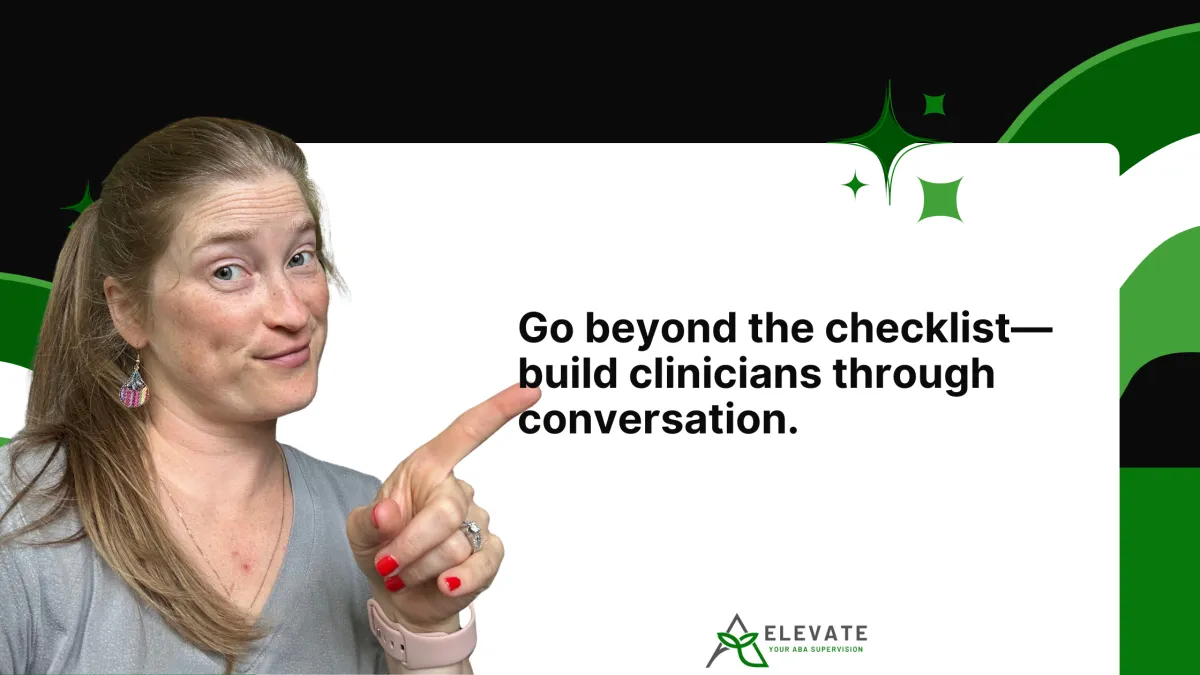
Beyond the Checklist: How to Make Assessments Conversational
Most supervision systems reduce assessment to a binary task: Can your RBT® do the skill or not? Check yes or no.
But here’s the problem—behavior change isn’t binary. And neither is learning.

The Problem: Checklists Without Conversation
Task lists serve a purpose. But when they become the sole focus of assessment, supervision misses the mark.
RBTs® learn to "perform" skills for observation rather than understand them.
Supervisors get surface-level insights but miss depth.
There’s no room for nuance, values, or growth mindset.
The Shift: Using Assessment to Spark Dialogue
What if assessments weren’t just about "what they did" but "how they think"?
Here’s what that looks like in practice:
Ask how your RBT® decided on a specific prompt or intervention.
Reflect on the why behind their actions.
Explore generalization: Can they apply the same principle in a new context?
The Bridge
Think of a checklist as a shoreline. Reflection and dialogue build the bridge to deeper waters—where professional growth really happens.
Conversation Starters for Deeper Supervision
Try these prompts during your next session:
"What influenced your decision to use that prompt?"
"How might this strategy look different with another client?"
"What would you do if the data didn’t show improvement?"
"How do your personal values show up in your interactions?"
These questions build metacognition and critical thinking—two essential elements for ethical practice.
Research Insight
Effective supervision is not only about task performance but also professional reasoning (Sellers et al., 2016). Conversation-based assessment promotes generalization, autonomy, and collaborative learning.
Try This
Pick one checklist item from your next supervision session. Instead of checking it off, build a 5-minute dialogue around it. Explore how the RBT® understands the concept, makes decisions, and sees its relevance.
The Takeaway
Assessments aren’t the end—they’re the entry point. Use them to create meaningful conversations that spark growth.
Compliance gets the form signed. Conversation builds the future clinician.
And soon, you’ll have a system that prompts those conversations without creating extra work.
Ready to Take Your Supervision to the Next Level?
If you're feeling the pressure to make your RBT® supervision more meaningful and manageable, you're not alone. Supervising isn't just about compliance—it's about connection, clarity, and cultivating confident, competent behavior technicians. Whether you're just getting started or looking to refine your approach, you don’t have to reinvent the wheel.
For more actionable tips, tools, and real-world resources to elevate your RBT® supervision game, head over to www.elevateyourabasupervision.com. It’s your one-stop hub for building better systems, stronger relationships, and sustainable supervision practices.
Want to dive deeper? Check out these CEU courses designed specifically for BCBAs® who supervise:
The Retention Revolution: The Secret to Reducing RBT Burnout – Discover proven strategies to keep your RBTs® engaged, energized, and empowered.
The Supervisor's Toolbox: Strategies for Building Effective Relationships – Learn how to foster trust, transparency, and team cohesion with your supervisees.
The Feedback Loop: Engineering a Culture of Collaboration and Growth in ABA – Transform your feedback from one-sided to collaborative, ongoing, and growth-oriented.
Precision Supervision: High-Yield Tools for Thriving RBTs® and Balanced BCBAs® – Streamline your systems and amplify outcomes with efficient, research-backed practices.
What Your Training Didn't Cover: Closing the Cultural Humility Gap in Supervision – Address the often-overlooked dynamics that impact equity and effectiveness in supervision.
Whether you're managing burnout, building rapport, or boosting clinical impact—you're not in this alone. You're building something meaningful. Let's make sure your supervision reflects that.
Reference
Sellers, T. P., Valentino, A. L., & LeBlanc, L. A. (2016). Recommended Practices for Individual Supervision of Aspiring Behavior Analysts. Behavior analysis in practice, 9(4), 274–286. https://doi.org/10.1007/s40617-016-0110-7
#ethicalsupervision #RBTgrowth #ABAskills #compassionateassessment #ABAinsights #clinicaldevelopment
